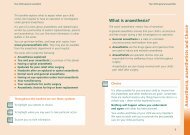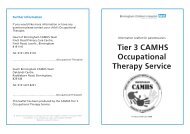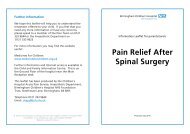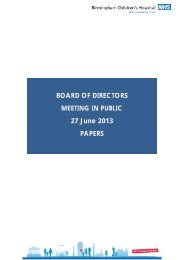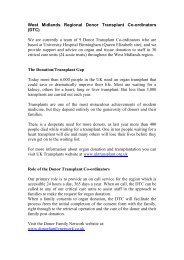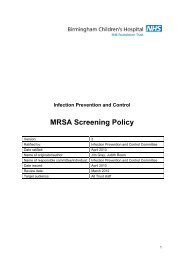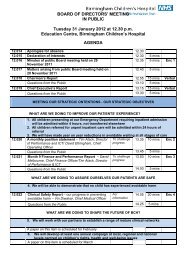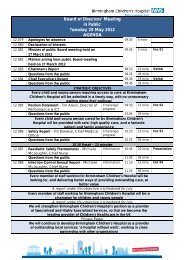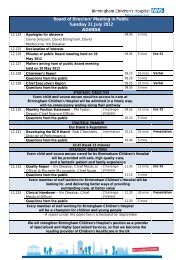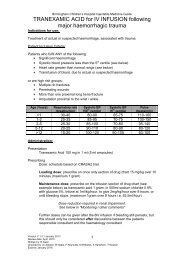Nurses Day! - Birmingham Children's Hospital
Nurses Day! - Birmingham Children's Hospital
Nurses Day! - Birmingham Children's Hospital
Create successful ePaper yourself
Turn your PDF publications into a flip-book with our unique Google optimized e-Paper software.
SECTION FOUR<br />
BACK TO CONTENTS PAGE<br />
Annual Governance Statement<br />
Scope of responsibility<br />
As Accounting Officer, I have responsibility for<br />
maintaining a sound system of internal control that<br />
supports the achievement of the NHS Foundation<br />
Trust’s policies, aims and objectives, whilst<br />
safeguarding the public funds and departmental<br />
assets for which I am personally responsible, in<br />
accordance with the responsibilities assigned to<br />
me. I am also responsible for ensuring that the<br />
NHS Foundation Trust is administered prudently<br />
and economically and that resources are applied<br />
efficiently and effectively. I also acknowledge my<br />
responsibilities as set out in the NHS Foundation<br />
Trust Accounting Officer Memorandum.<br />
The purpose of the system of<br />
internal control<br />
The system of internal control is designed to<br />
manage risk to a reasonable level rather than<br />
to eliminate all risk of failure to achieve policies,<br />
aims and objectives; it can therefore only provide<br />
reasonable and not absolute assurance of<br />
effectiveness. The system of internal control is<br />
based on an ongoing process designed to identify<br />
and prioritise the risks to the achievement of<br />
the policies, aims and objectives of <strong>Birmingham</strong><br />
Children’s <strong>Hospital</strong> NHS Foundation Trust, to<br />
evaluate the likelihood of those risks being<br />
realised and the impact should they be realised,<br />
and to manage them efficiently, effectively and<br />
economically. The system of internal control has<br />
been in place in <strong>Birmingham</strong> Children’s <strong>Hospital</strong><br />
NHS Foundation Trust for the year ended 31 March<br />
2013 and up to the date of approval of the annual<br />
report and accounts.<br />
Capacity to handle risk<br />
Leadership<br />
The Board of Directors is responsible for the<br />
management of key risks. Key risks are described<br />
within the Board Assurance Framework which is<br />
considered every month by the Board of Directors.<br />
In addition, risks are clearly defined within the<br />
reports presented to the Board by the Executive<br />
Directors. This process is supplemented on a<br />
quarterly basis when the self assessment of the<br />
financial, activity and service risks is made for<br />
submission to the independent regulator, Monitor.<br />
The Trust’s Risk Management policies clearly set<br />
out responsibilities for risk management within<br />
the organisation. As Chief Executive Officer I<br />
have overall responsibility and accountability<br />
for risk management. This is shared with the<br />
Executive Directors who are responsible for<br />
ensuring that the risk management framework is<br />
systematically implemented and developed across<br />
the organisation. In addition they, through the Board<br />
of Directors’ committee structure, are responsible<br />
for providing assurance to the Board of Directors<br />
that risk management continues to be an essential<br />
element of all management systems and corporate<br />
planning, as well as the setting of strategy and<br />
objectives. The committees for 2012/13 included<br />
the Quality Committee and the Finance and<br />
Resources Committee, which are both chaired by<br />
Independent Non-Executive Directors, with nonexecutive<br />
and executive director membership.<br />
The sub-committees which monitor risks to safety,<br />
quality and workforce objectives include the Clinical<br />
Risk and Quality Assurance Committee, the Non-<br />
Clinical Risk Coordinating Committee, the Patient<br />
Experience and Participation Committee and the<br />
Strategic Workforce Committee.<br />
Staff training and guidance<br />
A range of risk management and information<br />
governance training is provided to staff and there<br />
are policies in place to describe their role and<br />
responsibilities in relation to the identification<br />
and management of risk. This includes an online<br />
training resource for refresher training. This<br />
ensures that risks are actively managed at all levels<br />
of the organisation. The importance of feedback to<br />
staff on incidents reported is stressed at all levels of<br />
training.<br />
changes have been made to mandatory training<br />
related to medicines management, observation and<br />
monitoring, and resuscitation.<br />
Bespoke risk management training has also been<br />
developed for Board members and directors to<br />
enable them to fully understand their role and<br />
responsibilities in relation to risk management.<br />
The risk and control framework<br />
The Trust’s risk management policies ensure that<br />
risk management is embedded in the activities of the<br />
organisation in a number of ways:<br />
l Both Corporate and Directorate objectives are<br />
risk assessed and inform the Board<br />
Assurance Framework, which is reviewed<br />
regularly by the Board of Directors and the<br />
Audit Committee.<br />
l The Trust has achieved level 3 compliance with<br />
the NHS Litigation Authority (Clinical Negligence<br />
Scheme for Trusts) Risk Management<br />
Standards. This demonstrates not only that there<br />
are clearly defined and embedded policies in<br />
place to address risk but also that those policies<br />
are monitored on an ongoing basis and that<br />
action is taken when those policies are not<br />
effective.<br />
To ensure the quality of local management of<br />
incidents, we deliver training (level 2) for all local<br />
managers. This is an interactive session which<br />
covers day-to-day management of risks at a<br />
local level, investigation tips and techniques for<br />
managing incidents and complaints and guidance<br />
on how to carry out robust risk assessment and<br />
how to use the risk register appropriately.<br />
Level 3 ‘Risk Leaders’ training has been designed<br />
for members of staff that need a high level of<br />
expertise in risk management. The session is<br />
focused on Root Cause Analysis techniques<br />
and processes, includes some advanced risk<br />
management techniques and introduces the role<br />
and development of assurance frameworks.<br />
Training implications are considered as part of<br />
all Root Cause Analysis investigations. As a<br />
direct result of learning from these investigations,<br />
144 145<br />
l Risks to information are managed<br />
through the use of the NHS Information<br />
Governance Toolkit. The Trust’s policy provides<br />
a documented mechanism for the immediate<br />
reporting and investigation of actual or<br />
suspected information security breaches/ losses<br />
and potential ulnerabilities/weaknesses within<br />
the Trust.<br />
The Information Governance Toolkit<br />
submissions and the annual plan to improve<br />
compliance with the relevant standards is<br />
approved and regularly reviewed by the<br />
Regulatory Compliance Committee, which<br />
reports to the Board via the Quality Committee.<br />
Following a self-assessment and submission the<br />
overall score against the Information<br />
Governance Toolkit for 2012/13 was 82% and<br />
graded Green (‘Satisfactory’).



